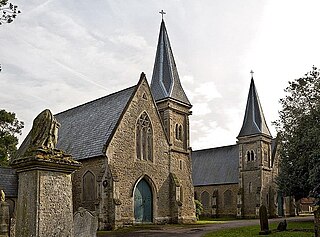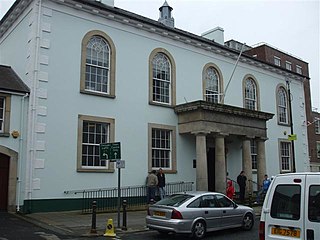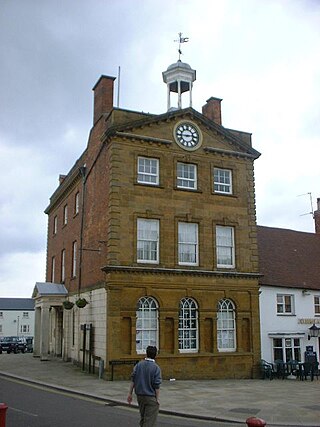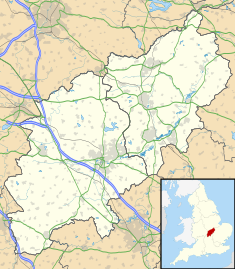
Northamptonshire is a county in the East Midlands of England. In 2021, it had a population of 747,622. The county is administered by two unitary authorities: North Northamptonshire and West Northamptonshire. It is nicknamed "The Rose of the Shires".

The Inner London Sessions House Crown Court, more commonly known as the Inner London Crown Court and distinct from the Inner London Magistrates' Court, is a Crown Court building in Newington, London, United Kingdom. It is located in the Sessions House on Newington Causeway at the corner of Harper Road. It is a Grade II listed building.

Northampton Guildhall is a municipal building in St Giles' Square in Northampton, England. It is a Grade II* listed building.

The Sessions House is a former judicial building on George Row in Northampton, England. The Sessions House, which was the main courthouse for Northamptonshire, is currently used as a tourist information centre and is a Grade I listed building. The building is adjacent to County Hall, the meeting place of Northamptonshire County Council.

Edmund Francis Law, usually referred to as 'E. F. Law', FRIBA was an English architect during the 19th century, notable for a large number of projects, particularly restorations, in the counties of Northamptonshire, Leicestershire and Rutland.

St Albans Town Hall, sometimes known as the Old Town Hall or The Courthouse, is a 19th-century building in St Albans, Hertfordshire, England. The building, which now accommodates the St Albans Museum, is a Grade II* listed building.

The Shire Hall is a municipal building in Fore Street, Hertford, the county town of Hertfordshire, England. The building, which currently serves as a Magistrates' Court, is a Grade I listed building.

The County Hall is a municipal building complex in Pegs Lane, Hertford, Hertfordshire. The building, which is the headquarters of Hertfordshire County Council, is a Grade II* listed building.

County Buildings is a municipal facility at Martin Street in Stafford, Staffordshire. The building, which is the meeting place for Staffordshire County Council, is a Grade II* listed building.

The Shire Hall is a municipal building in St Paul's Square, Bedford, Bedfordshire. The shire hall, which was the headquarters of Bedfordshire County Council from 1888 to 1969, is a Grade II listed building.

The County Offices, formerly Westmorland County Hall, is a municipal building in Stricklandgate, Kendal, Cumbria, England. The structure, which was the headquarters of Westmorland County Council from 1939 to 1974, is a Grade II listed building.

County Hall, formerly the Old Sessions House, is a municipal building in Sandling Road in Maidstone, Kent, England. The county hall, which is the headquarters of Kent County Council, is a Grade II listed building.

The County Offices is a municipal building in Newland, Lincoln in the county of Lincolnshire in England. It is the headquarters of Lincolnshire County Council.

Enniskillen Courthouse is a judicial facility in East Bridge Street, Enniskillen, County Fermanagh, Northern Ireland. It is a Grade B listed building.

Maidstone Town Hall is a municipal building in Middle Row, Maidstone, Kent, England. The town hall, which is a meeting place of Maidstone Borough Council, is a Grade II* listed building.

Brighouse Town Hall is a former municipal building in Thornton Square, Brighouse, West Yorkshire, England. The town hall, which was the headquarters of Brighouse Borough Council, is a Grade II listed building.

Towcester Town Hall is a municipal building in Watling Street, Towcester, Northamptonshire, England. The town hall, which is the meeting place of Towcester Town Council, is a grade II listed building.

The Moot Hall is a municipal building in Chapel Lane in Daventry, Northamptonshire, England. The building, which was the headquarters of Daventry Borough Council, is a Grade II* listed building.

The Municipal Offices is a municipal building in Bowling Green Road in Kettering, Northamptonshire, England. The building accommodates the offices and meeting place of Kettering Town Council.

Hanley Town Hall is a municipal building in Albion Square in Hanley, Staffordshire, England. The building, which is used as the local register office, is a Grade II listed building.























